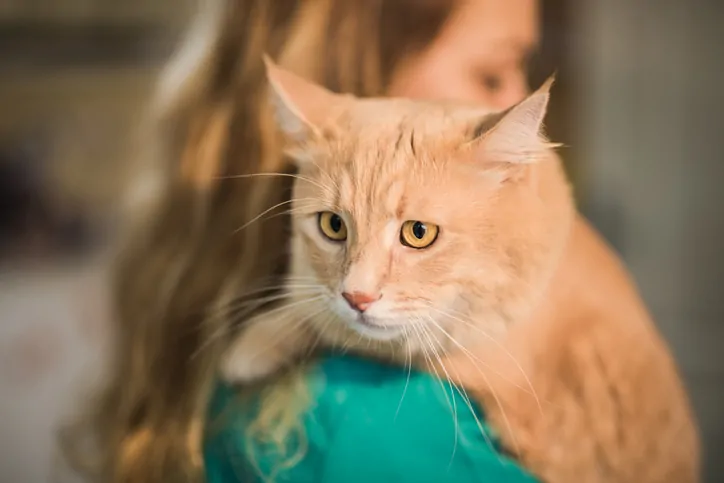Cats become infected with roundworms by ingesting worm eggs or nursing from infected mothers.
Roundworms are nematodes that occur as parasites within other animals and live primarily in their intestines.
Roundworm infection primarily causes digestive issues such as vomiting, diarrhea, and bloating, but can also cause anemia, weight loss, coughing, stunted growth, and vision loss.
Roundworms in cats are diagnosed through a stool examination, a fecal flotation test, or a protein antigen test.
Your vet will administer anthelmintic medication to your cat which kills parasites. Additional medication may be sent home or administered by your veterinarian at your cat's next checkup.
Staying on monthly, year-round prevention –routinely deworms them monthly as well as protects them from heartworm disease and fleas. Strict hygiene, rodent control, and periodic de-worming are a few ways you can prevent roundworms in cats.
The most common parasite that infects your cat is the roundworm. Roundworm infection occurs when cats ingest infected eggs or nurse from infected mothers. Also known as ascarids, roundworms use up the nutrients from your cat's food as it travels through their intestine, causing weakness. Roundworm infection in cats puts the whole family at risk as it can be spread to humans if they have an open wound when they pet an infected cat, clean litter boxes, or are otherwise exposed.

Roundworms are long, bilaterally-symmetrical nematodes that are tapered at both ends. Nematodes live in a variety of habitats, including soil, freshwater, marine, and deep water-filled crevices in the Earth's crust as well as in vinegar and beer malts. Nematodes, such as roundworms, exist as parasites in plants and animals. The roundworms found in cats average about 3 to 5 inches in length and are called Toxocara cati. Although Toxocara cati can spread to humans, the parasite does not mature to adulthood within a human host.
Roundworms pose a higher threat to kittens than they do to healthy adult cats. Regardless of age, cats with small worm populations may show no symptoms. While adult roundworms live in the intestines, roundworm larvae can travel throughout the lungs, liver, and other organs. These worms can cause damage to your cat's organ tissue, nerves, and even eyes. Other symptoms of roundworm infection include:
Significant numbers of worms moving into your cat's lungs may cause frothy nasal discharge, pneumonia, fluid in the lungs, breathing problems, and even death. Kittens suffer more severe complications from roundworm infestations that can include:
You may discover adult roundworms in your cat's poop or vomit. Adult roundworms have a white or light brown hue, and can be several inches long.
To diagnosis your cat, a veterinarian can perform a fecal flotation test. The test is performed by mixing a small amount of your cat's stool with a liquid solution which causes roundworm eggs to float to the top. Any eggs that are found may be examined under a microscope on a transparent slide.
False negatives are common because some cats are infected with immature roundworms that haven't reproduced yet. On occasion, adult worms are found in a cat's stool, which helps with diagnosis. Your vet could also use a test that detects a particular roundworm protein antigen in cat feces. Best practices dictate that your cat or kitten should receive roundworm treatment even if they test negative.
The good news is that roundworms are comparatively easy to treat in cats. Roundworms are treated with a de-worming medication, or anthelmintics, which kill parasites by causing paralysis or inhibiting the ability of young worms to mature into adults. Anthelmintic drugs that are effective for roundworm infections in cats include:
Over-the-counter dewormers are not recommended as a roundworm treatment for cats because roundworms have a complex life cycle. To be sure all adult roundworms and larvae are eliminated, your cat should be treated by your veterinarian. More roundworm treatments may be sent home or administered at your cat's next check-up.
If the right roundworm medication is administered promptly, the prognosis for roundworm infection is good. However, extremely diseased kittens sometimes pass away.
Roundworms can enter your cat's body in a variety of ways, therefore it's important to keep your cat's living space sanitized, and if at all possible, keep your cat inside to prevent them from consuming wild animals that might be roundworm carriers. Some other measures that prevent roundworm contamination are:
Strict hygiene can help prevent the spread of roundworms to humans. Symptoms of roundworm infection in humans include cough, fever, restlessness, stomach pain, vomiting, and wheezing. Adult roundworms may be present in human stool. Roundworms are treated in humans with a medicine that kills roundworms in around3 days.
Phone: (855) 461-8259
Email: [email protected]